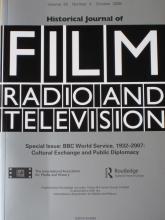Tuning In
Diasporic Contact Zones at the BBC World Service
Historical Journal of Film, Radio and TV

For an institution whose credibility rests on the maintenance of a reputation established over eighty years, an understanding of its past would seem an essential adjunct to contemporary practice. Yet there exists surprisingly little historical cartography of the BBC World Service in scholarly output and limited appreciation of the strategically significant role it has played in world affairs by the BBC’s domestic audiences. Forged by the geopolitical and cultural imperatives of empire, world war, cold war and post-colonial realities, overseas broadcasting from Britain has had to endlessly re-calibrate itself for an evolving world while maintaining recognisable institutional values that have stood the test of time. Once again on the cusp of a major reorganisation – large cuts in revenue and the anticipated move from grant-in-aid to Licence Fee funding – this special edition of the Historical Journal of Film, Radio and Television explores the past lives of the BBC World Service as a way of contextualising our present understanding of the work it does.
Project contact:
Dr. Alban Webb, The Open University, a.j.webb@open.ac.uk
Dr Alban Webb is a Research Fellow in Sociology at the Open University, working as part of the ESRC Centre for Research on Socio-Cultural Change (CRESC). His previous research as a historian has focused on Cold War Britain, examining the UK’s nuclear deterrence strategy, intelligence services and civil defence planning. His book on the BBC World Service, London Calling: BBC External Services and the Cold War, will be published in 2011. His latest research, on the roles of public and cultural diplomacy in the context of international relations (most recently as part of the AHRC-funded Tuning In: Diasporic Contact Zones at the BBC World Service project) forms the basis of his ongoing examination of the changing Cultures of Diplomacy at work in British overseas communication strategies.
Marie Gillespie is Professor of Sociology at the Open University and the Principal Investigator on Tuning In. She is Director of media research ESRC Centre for Research on Socio-Cultural Change (CRESC). Her research interests focus on the political, socio-cultural and economic implications of migrant transnationalism, especially in relation to the South Asian diaspora. Recent Open University teaching texts include an edited volume Media Audiences (2005) and Analysing Media Texts (2006). Recent research projects include: an audience ethnography of media coverage of the attacks of 9/11/2001; Mediating Security, a study on transnational news cultures and the politics of security. Her publications include a monograph entitled Television, Ethnicity and Cultural Change (Routledge, 1995).
Gerd Baumann, University of Amsterdam, has authored two long-term ethnographies: National Integration and Local Integrity in the Sudan (Oxford UP 1986) and Contesting Culture: Discourses of Identity in Multi-Ethnic London (Cambridge UP 1996). His ten other authored or (co-)edited theoretical volumes include: Civil Enculturation at Schools in Four European Countries (with W. Schiffauer et al.; Berghahn 2004; also in German); The Multicultural Riddle: Re-Thinking National, Ethnic and Religious Identities (Routledge 1999; also in five translations since) and Grammars of Identity / Alterity: A Structural Approach (with Andre Gingrich, Berghahn 2004; also in Spanish 2010). He has worked on the AHRC / OU research project on the BBC World Service since 2006, contributing to and co-editing four Special Issues of the Journals listed in the Project Bibliography.
Project members:
- BBC World Service Historical Pespectives


